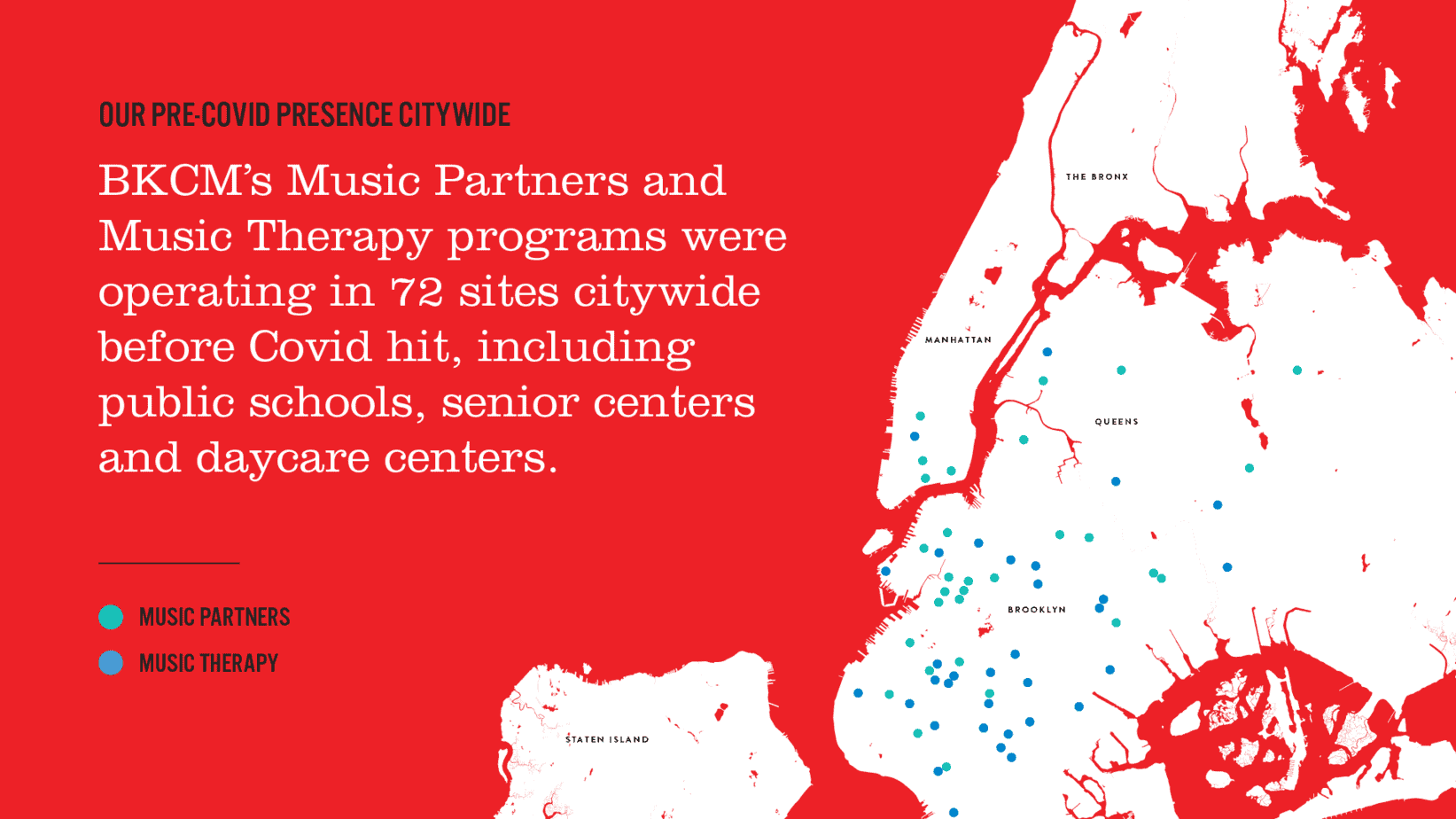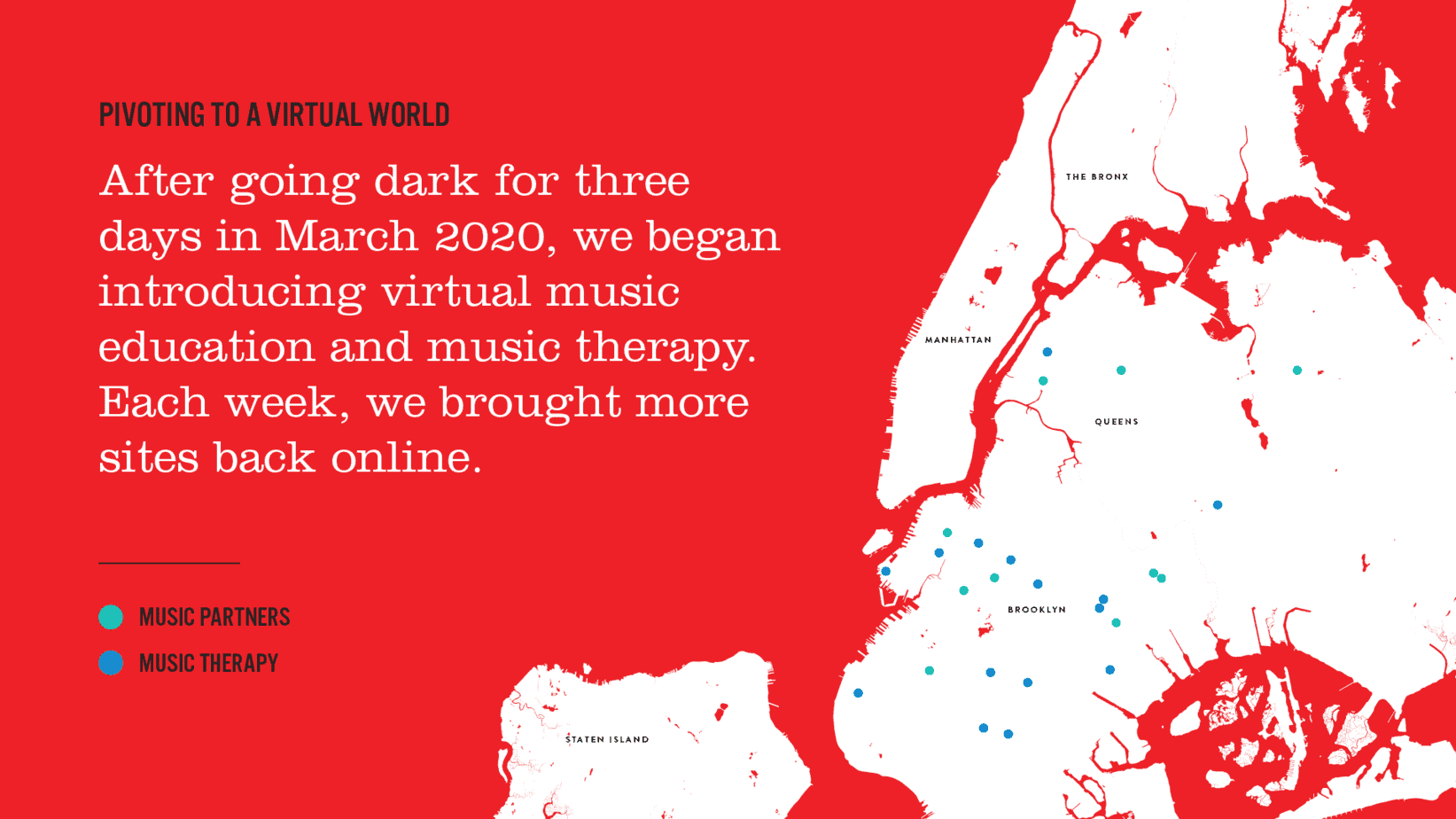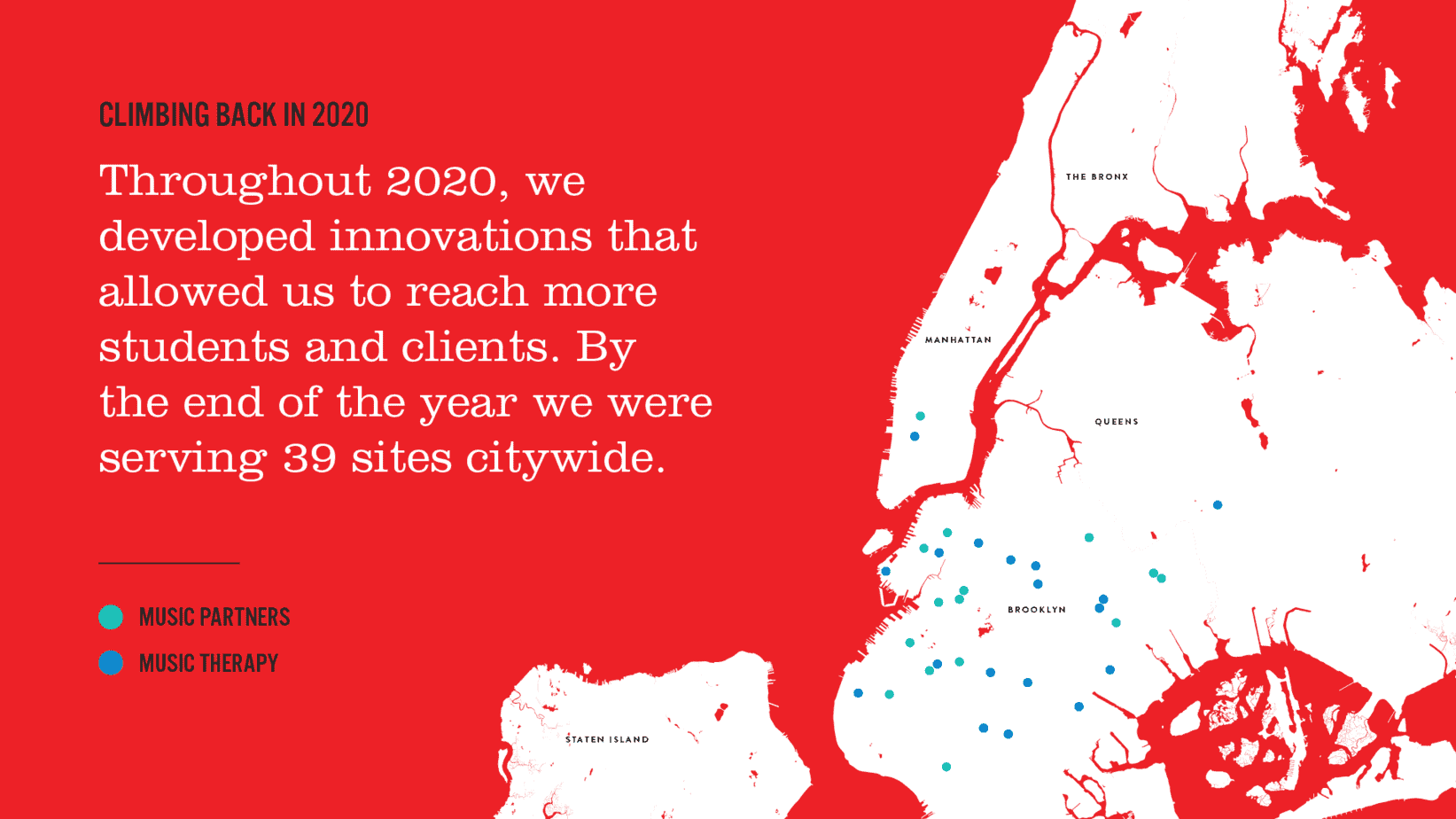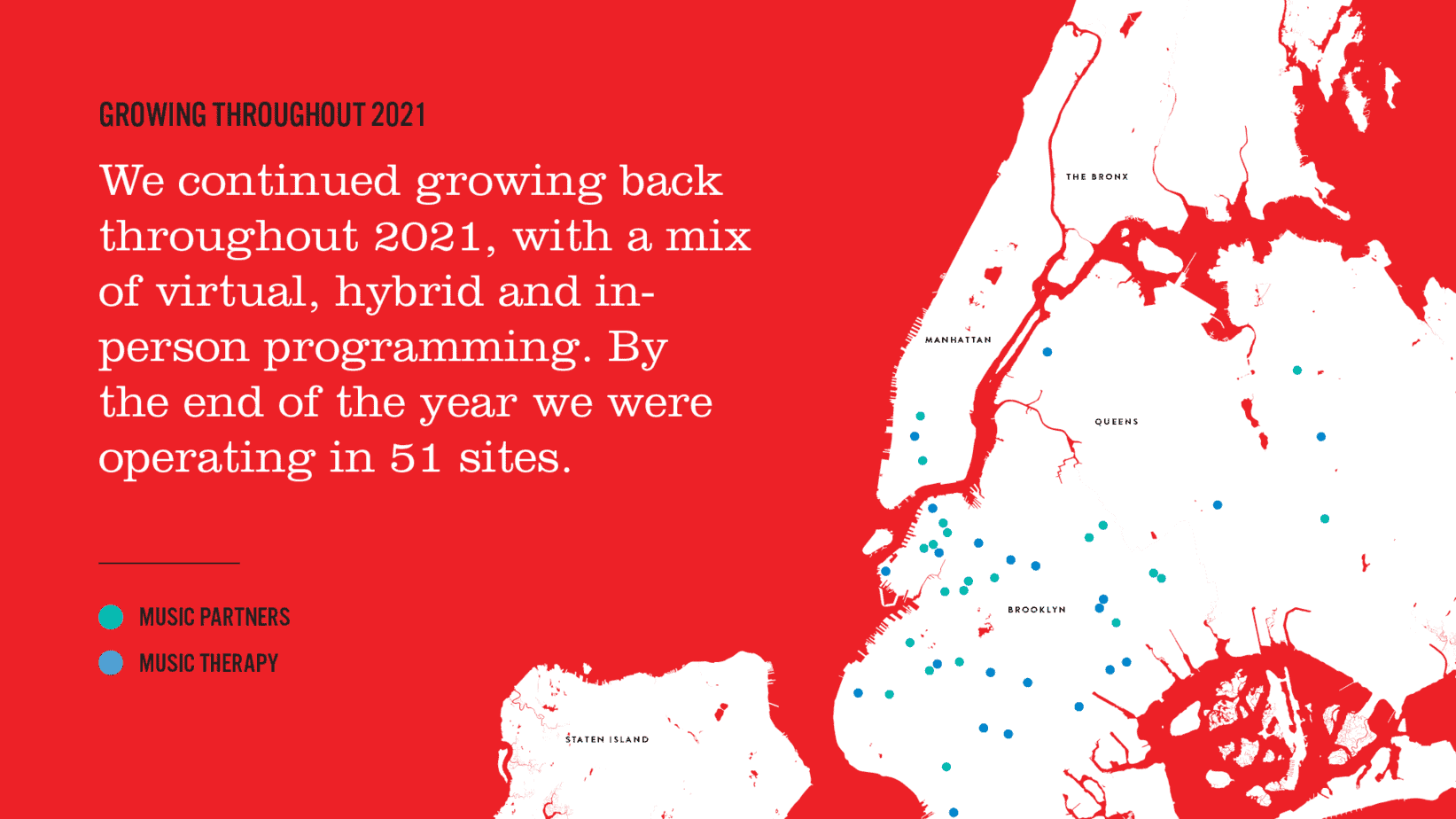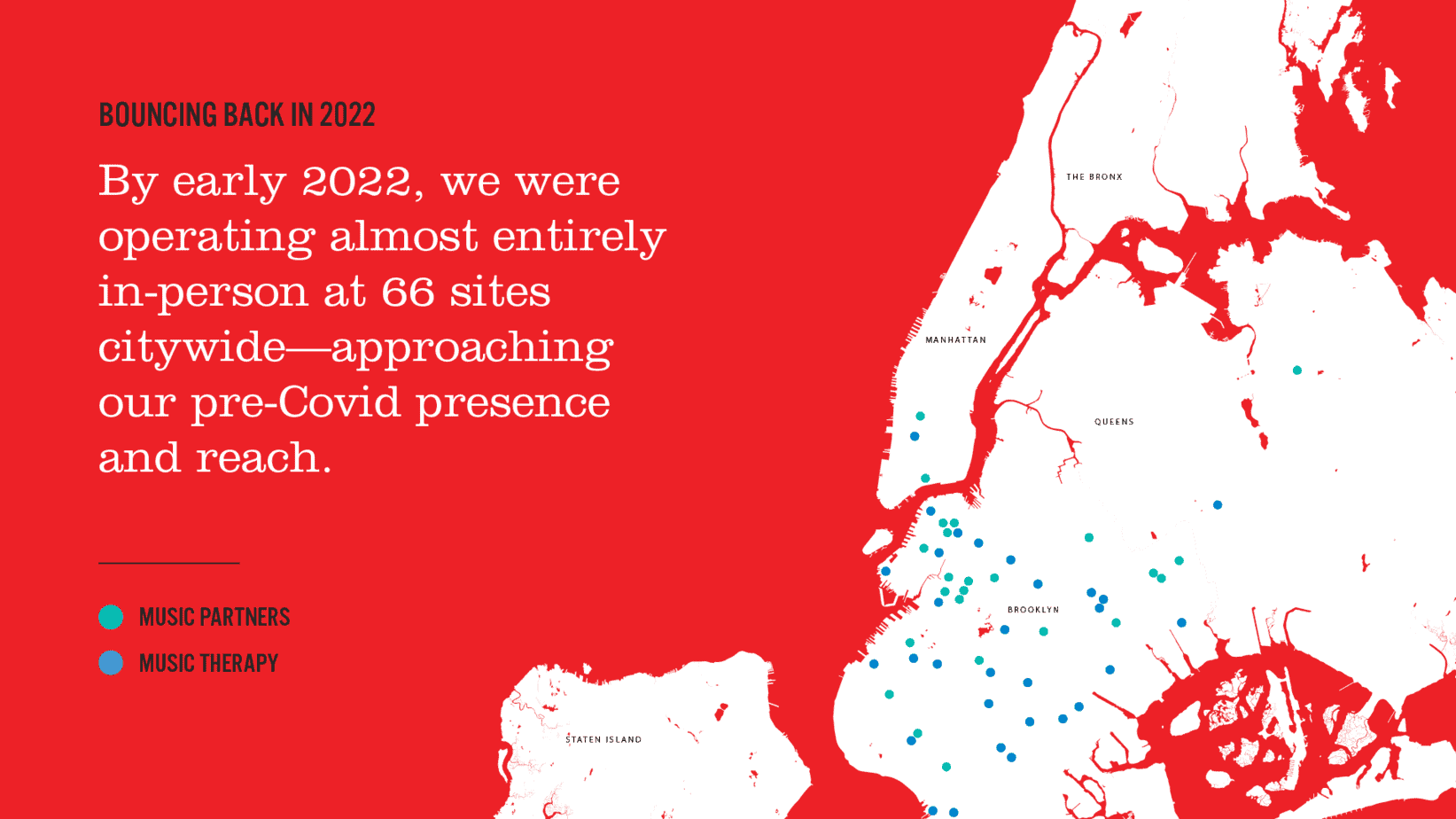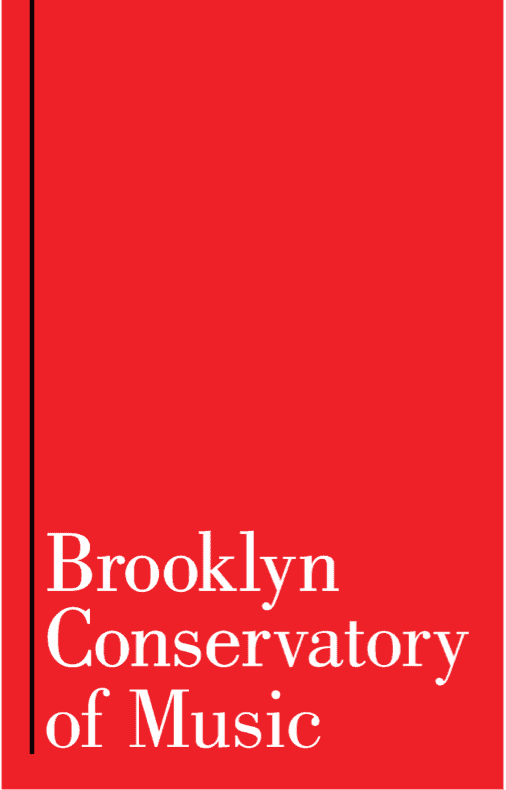
Slide 1

Annual Report
Letter From Our Executive Director
The Brooklyn Conservatory of Music emerged from the formidable challenges of 2021 as a stronger, healthier and more inclusive organization than we were pre-pandemic. This was no small feat.
In many ways, the challenges of 2021 were more complex than those of 2020. We operated in person throughout the year, adhering to a set of constantly shifting safety protocols. We grappled with the pandemic’s devastating fallout for many of our school- and community-based partner organizations. We asked even more of our faculty and staff, who had already moved mountains in 2020, to support our abrupt pivot to virtual music instruction and therapy.
For me, the moment that encapsulates 2021 at the Brooklyn Conservatory of Music was our adult winter recital, at which I had the pleasure of serving as emcee. In 2019, this event took place in person. In 2020, it took place entirely online. In 2021, it was a glorious hybrid event: dozens of masked, vaccinated students, teachers and family members gathered in our concert hall, while others joined in online.
The recital featured live performances from the Concert Hall as well as from students’ homes via Zoom. Others submitted recorded videos ahead of time. Everyone participated in a way that felt comfortable to them. The result was remarkable for our students and our in person and remote audience. The logistics, planning and preparation involved were extensive.
As an organization, we have a tremendous amount to be proud of as we look back on 2021. Even so, I want to be clear: it has not been easy. We enter 2022 extremely mindful of the toll the past two years have taken and with an eye toward rebuilding and recovery.
One example of how we intend to act on this is our new policy of offering full- and part-time staff members paid sabbaticals. By ensuring that our people feel valued, energized and taken care of, we are making an important investment in our future.
Indeed, we have continued to invest in the future of this organization throughout the past two years. Even during the pandemic’s darkest days, we didn’t just try to survive. We drew on our wellspring of creativity and agility to develop innovations that would serve us and our community in the years and decades to come—regardless of what that future may hold.
We deepened and broadened our work around diversity, equity and inclusion, which was a clearly defined pre-pandemic priority that gained new urgency over the past two years. Committees involved in DEI work have met more than 70 times since 2019, examining our hiring practices, recruitment efforts, event outreach and repertoire through the lens of DEI.
We extended musical opportunities to a broader range of New Yorkers, and blunted the financial impact of the pandemic, by supporting our families with a record amount of financial aid in 2021.
This included both direct aid, through scholarships, and indirect aid, by connecting music therapy clients with government aid to which they are entitled.
Even the decision to transform our Annual Report into a digital document exemplifies our determination to keep challenging ourselves to innovate, reach more people and be more resource-efficient. I hope you enjoy the fruits of this experiment and welcome your feedback.
Reflecting on all we’ve overcome and accomplished over the past two years, it strikes me as no coincidence that we are an institution built around music.
Music elevates us, enriches us and allows us to tap into abilities we didn’t know we had. Music brings people together. The skills that music requires and fosters—resilience, flexibility, hard work, improvisation, connection—are the precise qualities that have enabled BKCM to flourish in challenging times.
Thank you for your continued partnership, as we continue to draw on these qualities to take on new challenges together.
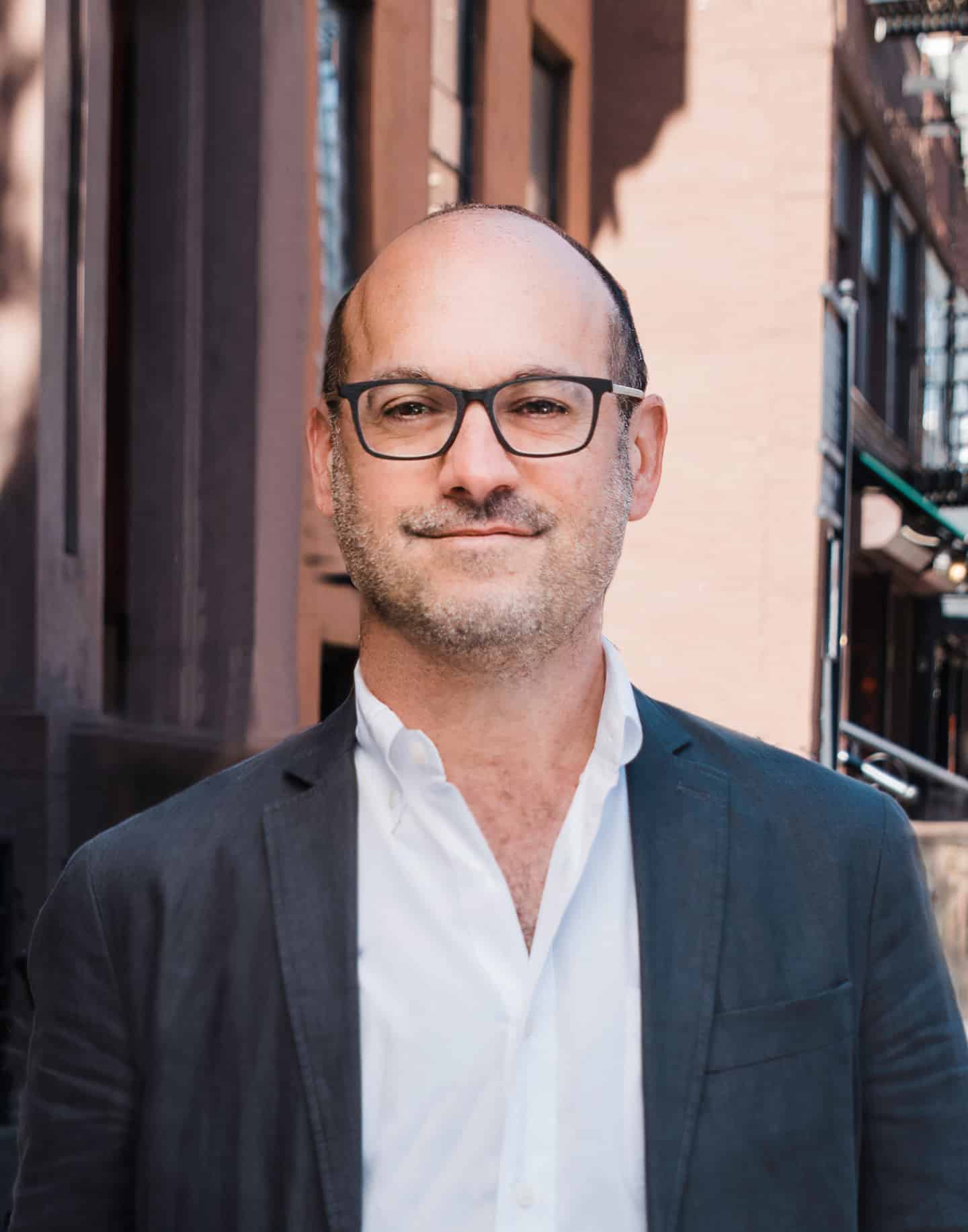
Chad Cooper

Executive Director, BKCM

Executive Director, BKCM
Letter From Our Board Chair
In March 2022, BKCM’s Board of Directors met in person for the first time in over two years. This gathering to reflect on our progress, review our incredible achievements and chart our future felt like a homecoming. It was a time to collectively exhale and set our sights on an exciting road ahead.
The centerpiece of our meeting was BKCM’s 5-Year Strategic Plan Refresh, which we are rolling out in tandem with this 2021 Annual Report.
Our original 2019-2024 Strategic Plan was just under a year into its implementation when Covid hit. Suddenly we were faced with new needs, unanticipated challenges and unprecedented circumstances. Certain pre-Covid priorities gained new urgency while others were, by necessity, temporarily de-emphasized. Even so, the overarching objective of our original Strategic Plan—investing in the organizational capacity of the Brooklyn Conservatory of Music—continues to be a priority.
Our Strategic Plan Refresh document, which I invite you to peruse, outlines how we are incorporating our key insights, emerging priorities and most valuable Covid-era adaptations to make BKCM a stronger, more inclusive organization.
As I hope you will glean from this Annual Report, we are already making great strides. We are revamping our hiring and recruitment practices to remove biases from the process and diversify our candidate pool. We have dramatically increased financial aid. We are developing plans to increase our presence in neighborhoods throughout New York City, to reach a broader swath of New Yorkers. We are also holding ourselves accountable, through measures including a rigorous survey process that allows us to routinely benchmark our performance.
On behalf of the Board of Trustees, I would like to offer my sincerest gratitude to the remarkable people who have sustained and strengthened BKCM during two challenging years.
Thank you to our faculty and staff. Your creativity, dedication, passion and boundless talent shone through whether you were meeting students on Zoom, teaching from across a plexiglass divider or working behind the scenes to bring our programs to life.
Thank you to our families. You stuck with us through constantly shifting program structures and safety protocols, always showing up as true partners to BKCM.
Thank you to our broader community. We look forward to making music with you in 2022 and beyond, as we continue to experiment with a broader range of in-person, hybrid and virtual events and opportunities.
Thank you to our donors. Amid economic uncertainty, your generosity prevailed. Our total budget has grown to $5.8 million today from $3.8 million in 2019, enabling us to deliver quality music enrichment and music therapy to New Yorkers across the city.
Because of you, BKCM is a stronger and healthier organization than it was in 2019. We have a great deal of work ahead of us—but knowing what we’ve accomplished, I am optimistic and truly excited about where we’re going.

Henry Choi

Chair, BKCM Board of Trustees

Chair, BKCM Board of Trustees
Board and Staff
BOARD OF TRUSTEES
Henry Choi CHAIR
Robin Dull VICE CHAIR
David Sweeny SECRETARY
Tatyana Gershkovich TREASURER
Daniel DiPietro, Nicholas Doering-Dorival, Eric Friedman, Neil Gupta, Dede Lee-Moore, Mari Matoba, Margaret Meyers, Nancy Ziegler Nayar, Preetha Nooyi, Naomi Nwosu-Stewart, Erica Oquendo, Keith Byron Otuomagie, Konrad Payne, Sailaja Sastry, Frederick Tang, Pierre Vilain, James Weiss, Rob Wetstone
ADVISORY COUNCIL
Sophie Balcoff, Vanessa Banigo, Scott Cantone, Richard Daskin, William Frick, Lynn Gaffney, Judith Helf, Rachel Hughes, Florence Hutner, Chiwoniso Kaitano, Elaine Kanak, Diana Kim, Andrea Knutson, Vijay Kumra, Bernadette Levandowski, Christopher Lloyd, Jerri Mayer, Vivek Menezes, Alan Ochoa, Anna-Lise Santell, Christine Scanlon, Russ Soper, Vanessa Treers, Man Wong, Tom Xu
SENIOR LEADERSHIP
Chad Cooper, Executive Director
Michaela Mechlovitz, Director of Administration
Rose Crichton-White, Director of Marketing and Development
Shameeza Chandarpal, Director of Finance
Uton Onyejekwe, Director of Diversity, Equity and Inclusion
Julianne Carney-Chung, Director, Suzuki Program
Brian Drye, Director, Community Music School
Dorothy Savitch, Director, Music Partners
Toby Williams, Director, Music Therapy
Our presence: click through to see our COVId Journey
BKCM Programs
Community
Music School
The core values of our Community Music School—joy, community, perseverance, quality and creativity—were essential as we navigated the challenges of 2021. Throughout the year our faculty, composed almost entirely of active working musicians, instilled these values in our students during private lessons, group classes, ensembles and workshops taking place every day of the week. In 2021 CMS offered instruction in instruments including harp, tabla and tuba, and in genres ranging from jazz to classical to bluegrass. While we have a reputation for excellence and rigor, we remain a true community music school, welcoming students of all ages, abilities and skill levels.
“
During the height of the pandemic, logging on to virtual music classes at BKCM was the highlight of my week. Now that we’re back in person, I’m thrilled to be singing live in my individual and group classes. I’m so grateful to be with my peers again, who share the same passion that I do. Especially during Brooklyn Harmonics Teens, it’s like a breath of fresh air to feel the in-person connection as we sing in unison and work on our craft.
”
Xiomara Sanchez17, Community Music School student
“
When we were remote and hybrid, we spent a lot of time building resources, skills and tools for online learning—and we got pretty great at it! But being back in the building with students and fellow faculty members, and exchanging human energy, is so much different. It’s great to be back.
”
Ivan ArteagaCommunity Music School Faculty Member
“
The flexibility, creativity and dedication of our CMS faculty throughout 2021 allowed our students to continue growing, learning and developing their artistry over months of virtual and hybrid instruction. At our first in-person recitals since the pandemic began, I was blown away by the students’ performances. No one had missed a beat.
”
Brian DryeCommunity Music School Program Director
The Community Music School in 2021:
By The Numbers
390
students in private lessons
283
students in group lessons
65
faculty
24
instruments
20
ensembles
16
classes
BKCM Programs
Suzuki
BKCM is Brooklyn’s premier destination for the Suzuki method, a nurturing pedagogy based on the concept that all children have the ability to master the language of music, just as they master their home language. In 2021 our rigorous curriculum immersed 218 students, ages 3-18, in violin, viola, cello, bass, guitar, flute and piano instruction. Our program encompasses private lessons as well as group classes and ensembles, and parents learn alongside their children—providing encouragement and support throughout their musical journeys. Students continually revisit repertoire, refining their skill by adding layers of artistry, mastery and musicianship.
“
I write letters of recommendation for preschool, for middle school, for high school and for college, all for the same kid. It’s not just a transactional relationship that we have with our students. We are part of their upbringing for all of their childhood.
”
Aaron Van HeyningenSuzuki faculty member
“
Our Suzuki program carried every member of our community through the pandemic, giving us something to rally around. Parents consistently reported that music lessons were the thing that kept their children going, and that holding and engaging with an acoustic instrument was a lifesaver in a world of Zoom. Now that we’re back in person, we have an even deeper appreciation for each moment we’re able to make music together.
”
Julianne Carney-ChungSuzuki Program Director
“
We are incredibly grateful for the hard work, flexibility and commitment of faculty and staff at BKCM during this very challenging year. The Suzuki program anchored us in the darkest moments of 2021 and helped us keep moving forward every day.
”
Dana TuqanSuzuki parent
Suzuki in 2021
By The Numbers
218
students
7
instruments
25
faculty
$31,300
in financial aid distributed
20
children, ages 0 to 4, enrolled in our Suzuki Early Childhood Education (SECE) program
BKCM Programs
Music Therapy
BKCM is a national leader in music therapy, a psychotherapeutic practice in which clinically trained professionals work in relationships with clients of all abilities, using music for developmental and social-emotional growth. Our 20 credentialed music therapists work with clients at BKCM and 32 community outreach sites citywide. In 2021 the vast majority of our programming was once again in-person, while our quick pivot to virtual music therapy in 2020 permanently broadened our ability to reach immunocompromised clients and support our parents and faculty with rich online education and skill-building opportunities.
“
Over 4 years, BKCM’s Music Therapy program has contributed to my son’s significant improvements in speech, social skills, direction-following and overall confidence. He’s also developed friendships with the other students in his class, whom he cheerfully greets with a ‘hello’ and a smile every week.
”
PETER HEROLD Father of music therapy client
“
The ability to continue working with our clients throughout the pandemic was absolutely critical. If we, as therapists, can model adaptability to meet the moment, that becomes part of the therapy.
”
Toby WilliamsMA, MT-BC, LCAT, Music Therapy Program Director
“
BKCM’s Music Therapy program is one of a kind: We have a large team and we all work independently, but there’s a real sense of community and support. We serve clients across the city, from all walks of life and of all ages, from infants to seniors. For one Conservatory to be able to reach all of those populations is an amazing thing and something I really value.
”
Dannyele CrawfordBKCM music therapist and Music Therapy Outreach Program Coordinator
Music Therapy in 2021
By The Numbers
1,450
clients at 32 community outreach sites citywide
120
clients onsite
20
credentialed music therapists
$121,600
in financial aid and assistance
6
partnerships with colleges and universities: Berklee College of Music, Molloy College, Montclair State, SUNY New Paltz, NYU and (as of 2021) Howard University
BKCM Programs
Music Partners
Music Partners places skilled teaching artists in public schools, senior centers, childcare centers and other community settings citywide. With offerings including percussion, recorder, musical theater, early childhood music and movement, band, strings, guitar, ukulele, chorus and songwriting, Music Partners works closely with local organizations to tailor programs and curricula to each site’s priorities and needs. Throughout 2021, many of our school and community-based partner organizations remained overwhelmed and significantly debilitated by the pandemic. To address this challenge and better position ourselves for the future, we worked to identify new ways of reaching students and families directly. This work is ongoing, with several exciting pilot programs underway.
“
Teaching students virtually through Music Partners was a highlight of the pandemic for me. Knowing that their worlds were thrown upside down, I sought to make our sessions as fun as possible, with the express goal of guiding them towards producing art of their own making that would stay with them forever.
”
Uton OnyejekweMusic Partners teaching artist and BKCM Director of DEI
“
The heart and soul of what we do is teaching kids how to play instruments and sing and create. The pandemic actually gave us more tools to do that: We can teach film scoring now, we can teach digital music composition, we developed an online Summer Band Camp that was more popular and successful than we could have imagined. In 2021 we became experts in these new ways of engaging kids and helping them express their creativity.
”
Dorothy SavitchMusic Partners Program Director
“
I heard most of my daughter's Music Partners Zoom classes, and I was so impressed by how calm and patient the teacher was with my daughter and the other students. My daughter was very proud of herself when she finally learned the basics of how to play, when she succeeded playing the songs and especially when she came up with her own songs. She had a great learning experience.
”
AnonymousParent of Music Partners Student
Music Partners in 2021
By The Numbers
27
schools and community centers served by Music Partners teaching artists in 2021
45
teaching artists in 2021
62
students participating in Music Partners virtual band camps (pioneered in 2020 and expanded in 2021)
72
ukuleles purchased in 2021, replacing chorus and recorder to promote health and safety during the pandemic
Financial Aid in 2021
By The Numbers
$296,000
Amount of financial aid raised
160
Number of Students benefiting from financial aid across programs
Financial Aid
We dramatically expanded our financial aid in 2021 to attract and retain students from a broad range of backgrounds and income levels, and to blunt the financial impact of the pandemic, raising almost $300,000. We directly (through scholarships and subsidies) or indirectly (by helping families access government aid) provided financial aid for more than 160 students and clients across our four divisions. In FY22 we are pacing to raise 60% more in financial aid than FY21!
Diversity, Equity and Inclusion (DEI)
We are in the midst of a thorough, thoughtful process to examine every aspect of our organization through the lens of DEI, with the goal of making BKCM a welcoming, inclusive home for all New Yorkers interested in high-quality music education and music therapy. This process is one of our most important undertakings.
We are reviewing our leadership, marketing, curriculum, hiring practices, recruitment efforts, individual program cultures and broader institutional culture as part of this effort. Students, parents, faculty, staff and our broader community are involved in this work.
While much remains to be done, in 2021 we made meaningful progress toward our goal of becoming a more diverse, equitable and inclusive institution.
We hired veteran Music Partners teaching artist Uton Onyejekwe as BKCM’s first Director of DEI.
We conducted a large-scale survey that included questions about our stakeholders’ demographics and how they perceive BKCM. 1,200 students, parents, faculty, staff and board members participated. The baseline data gathered from this survey will enable us to measure our progress over time.
Our Board of Trustees continued to grow and become more representative of the communities we serve. Our Board is now a majority persons of color.
We launched a three-part training workshop for all BKCM staff and faculty, focused on developing culturally responsive and culturally sustaining teaching practices.
We raised a record amount of financial aid – nearly $300,000 – in order to make our programs more accessible to more New Yorkers.
We used events, wherever possible, to advance our DEI goals—producing our first Juneteenth Celebration (an afternoon of music and poetry in Crown Heights), contributing a movie tunes singalong to Brooklyn Pride’s family programming and bringing hundreds of people together for our fifth annual World Refugee Day Music Festival (in collaboration with Catholic Charities and other partner organizations).
We hosted rapid-response events, like a musical assembly and rally held amid a spate of violence against Asian Americans, Native Hawaiians and Pacific Islanders. Timely gatherings like these enable our community to speak out against racism and injustice in meaningful, authentic ways.
Over 190 in-person, hybrid and virtual events in 2021 celebrated, united, inspired and broadened our community.
BKCM Events
Brooklyn Conservatory Community Orchestra (BCCO) Concert
BKCM Events
Music & Movement Workshop with Dancewave
BKCM Events
Spring Benefit Music Festival
BKCM Events
House Party
BKCM Events
Spring Benefit Music Festival
BKCM Events
Juneteenth Celebration
BKCM Events
Assemble Against Hate Solidarity March
BKCM Events
Lunar New Year Celebration
BKCM Events
House Party
BKCM Events
Spring Benefit Music Festival
BKCM Events
Spring Benefit Music Festival
BKCM Events
World Refugee Day Music Festival
BKCM Events
Halloween at Boo!KCM
BKCM Events
Lunar New Year Celebration
BKCM Events
Fall Fest
BKCM Events
Holiday Brass Play-Along
BKCM Events
Klezmer Hanukkah Party
BKCM Financials
Operating Statement
| 2021 | 2020 | 2019 | 2018 | 2017 | |
|---|---|---|---|---|---|
| Total Earned Revenue and Public Support | $5,171,000 | $4,577,000 | $4,439,000 | $3,853,000 | $3,435,000 |
| Total Operating Expenses | $4,793,000 | $4,508,000 | $4,038,000 | $3,582,000 | $3,132,000 |
| Surplus/(Deficit) | $378,000 | $69,000 | $401,000 | $271,000 | $303,000 |
Assets
| 2021 | 2020 | 2019 | 2018 | 2017 | |
|---|---|---|---|---|---|
| Cash | $2,113,000 | $1,784,000 | $1,179,000 | $573,000 | $480,000 |
| Accounts Receivables | $1,105,000 | $398,000 | $560,000 | $993,000 | $696,000 |
| Fixed Assets | $2,147,000 | $1,208,000 | $1,171,000 | $1,231,000 | $1,291,000 |
| Total Assets | $5,365,000 | $3,390,000 | $2,910,000 | $2,797,000 | $2,467,000 |
Liabilities
| 2021 | 2020 | 2019 | 2018 | 2017 | |
|---|---|---|---|---|---|
| Accounts Payable and Accurals | $188,000 | $192,000 | $213,000 | $135,000 | $113,000 |
| Loans | $2,057,000 | $1,066,000 | $311,000 | $372,000 | $416,000 |
| Deferred Revenue | $1,078,000 | $469,000 | $791,000 | $1,096,000 | $1,014,000 |
| Total Liabilities | $3,323,000 | $1,727,000 | $1,315,000 | $1,603,000 | $1,543,000 |
Total
| 2021 | 2020 | 2019 | 2018 | 2017 | |
|---|---|---|---|---|---|
| Total New Assets | $2,042,000 | $1,664,000 | $1,595,000 | $1,194,000 | $924,000 |
| Total Liabilities and Net Assets | $5,365,000 | $3,391,000 | $2,910,000 | $2,797,000 | $2,467,000 |
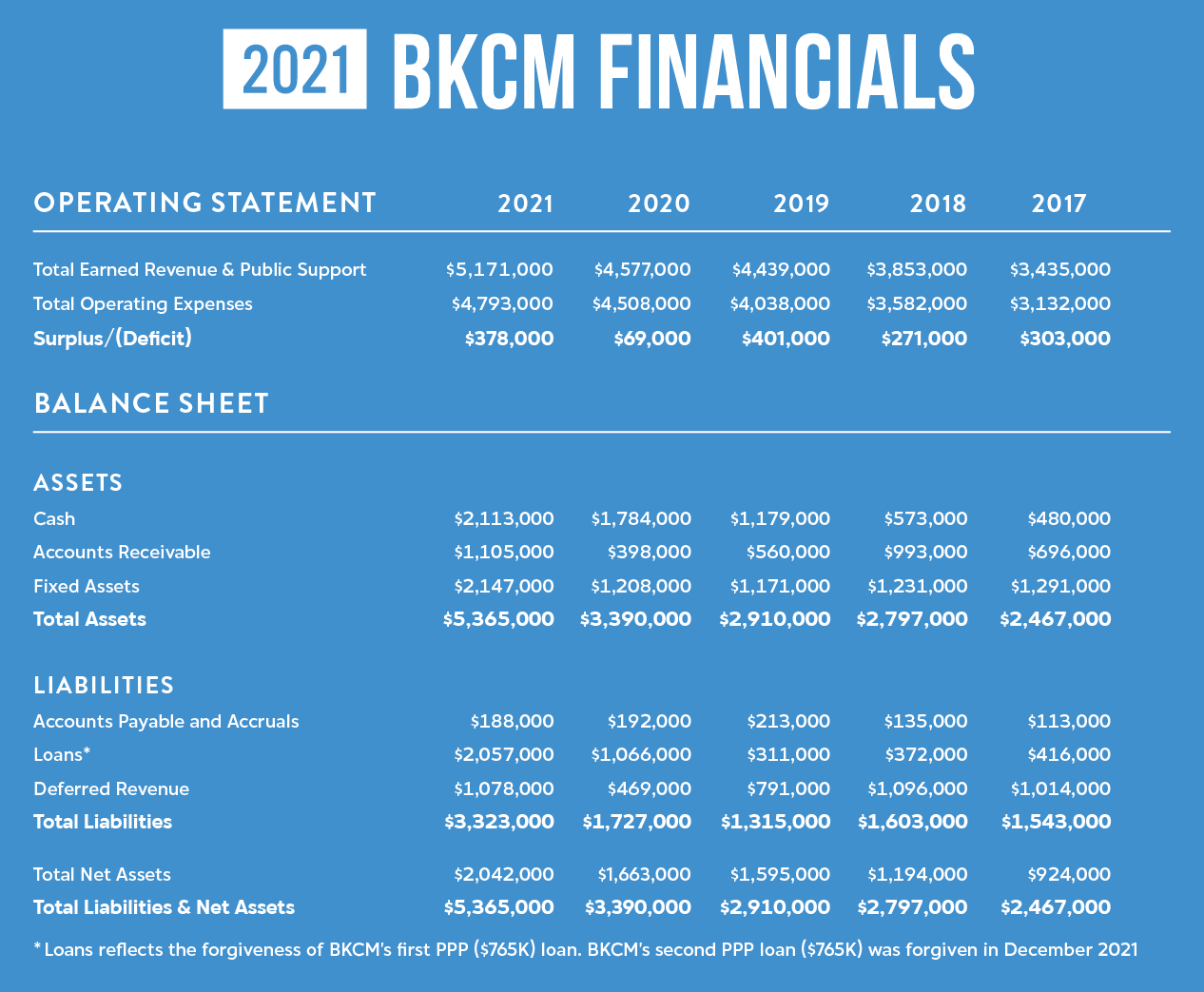
Sources of Funds
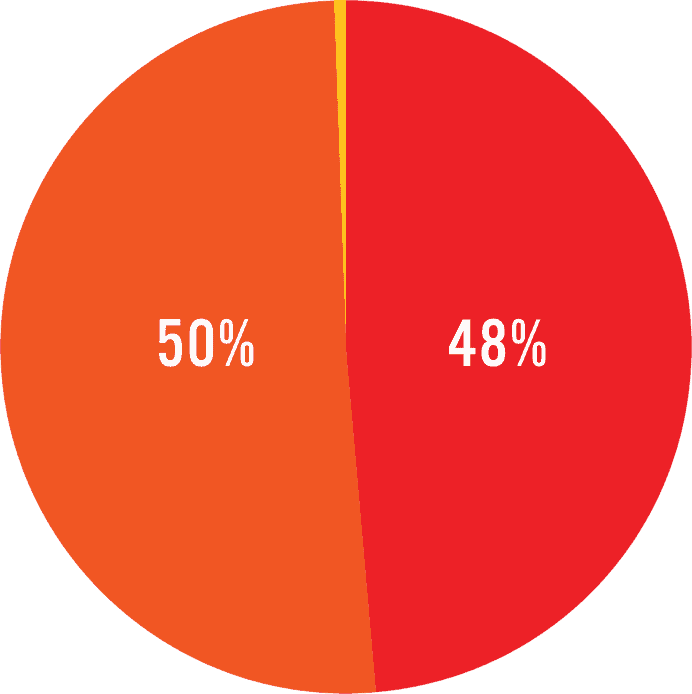
Earned Revenue
$2,520,932
Contributions
$2,624,209
Other
$25,861
Total $5,171,002
Uses of Funds
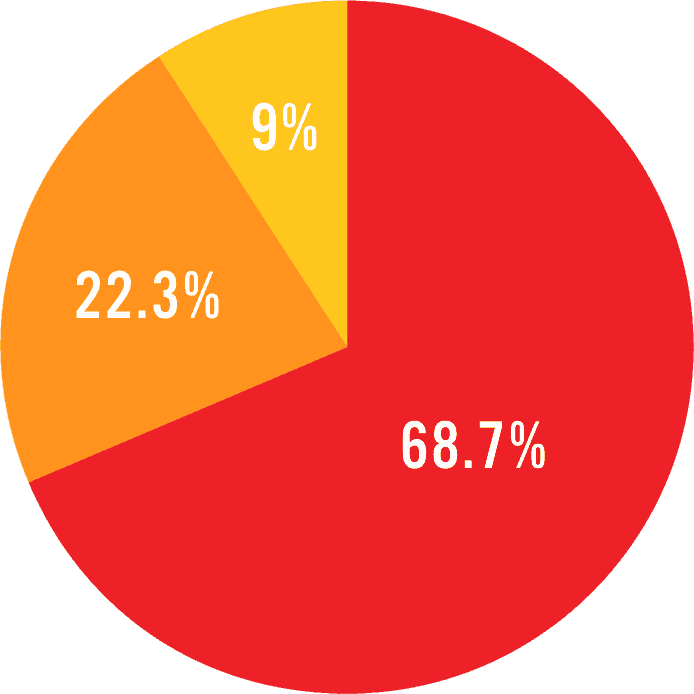
Programming
$3,293,071
Administration
$1,067,207
Fundraising
$432,207
Total $4,792,502
Thank You To Our Donors
= Foundation
= Individual
= Corporation
= Other
About BKCM
Lessons, Classes & Ensembles
Divisions
Support BKCM
58 Seventh Avenue, Brooklyn NY 11217 Open in Google Maps | 718-622-3300 | Let’s Connect
